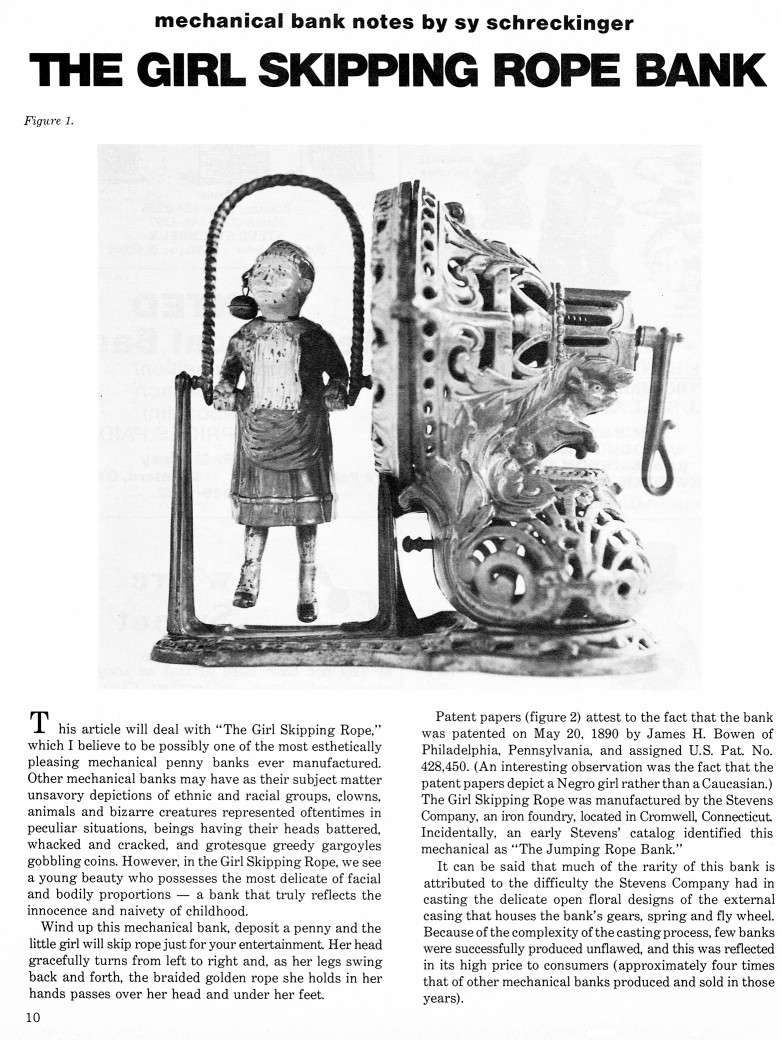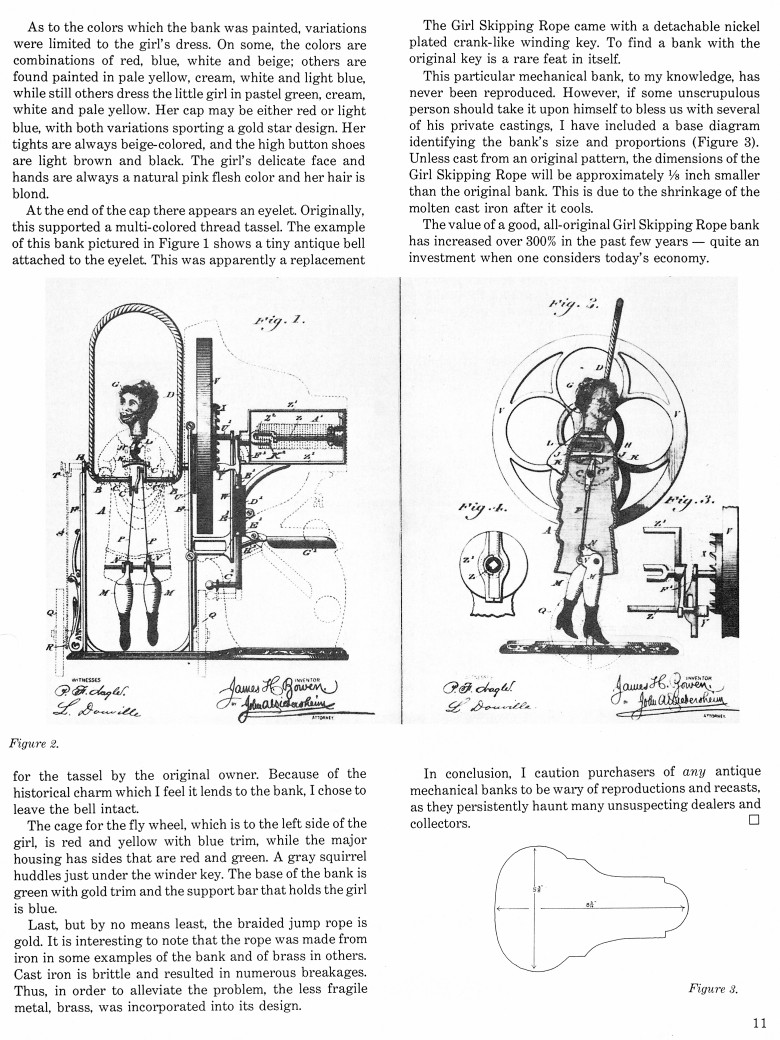|
The Girl Skipping Rope
Bank
by Sy Schreckinger – ANTIQUE TOY WORLD Magazine – December,
1982
This article will deal with "The Girl Skipping
Rope." which I believe to be possibly one of the most esthetically
pleasing mechanical penny banks ever manufactured. Other mechanical banks
may have as their subject matter unsavory depictions of ethnic and racial
groups, clowns, animals and bizarre creatures represented oftentimes in
peculiar situations, beings having their heads battered, whacked and
cracked, and grotesque greedy gargoyles gobbling coins. However, in the
Girl Skipping Rope, we see a young beauty who possesses the most delicate
of facial and bodily proportions — a bank that truly reflects the
innocence and naivety of childhood.
Wind up this mechanical bank, deposit a penny and the little girl
will skip rope just for your entertainment. Her head gracefully turns from
left to right and. as her legs swing back and forth the braided golden
rope she holds in her hands passes over her head and under her feet.
Patent papers (figure 2) attest to the fact that the bank was
patented on May 20. 1890 by James H. Bowen of Philadelphia, Pennsylvania,
and assigned U.S. Pat, No.
428,450. (An interesting observation was the
fact that the patent papers depict a Negro girl rather than a Caucasian.)
The Girl Skipping Rope was manufactured by the Stevens Company, an iron
foundry, located in Cromwell, Connecticut. Incidentally, an early Stevens'
catalog identified this mechanical as "The Jumping Rope Bank."
It can be said that much of the rarity of this bank is attributed to
the difficulty the Stevens Company had in casting the delicate open floral
designs of the external casing that houses the bank's gears, spring and
fly wheel. Because of the complexity of the casting process, few banks
were successfully produced unflawed, and this was reflected in its high
price to consumers (approximately four times that of other mechanical
banks produced and sold in those years).
As to the colors which the bank was painted, variations were limited
to the girl's dress. On some, the colors are combinations of red, blue,
white and beige; others are found painted in pale yellow, cream, white and
light blue, while still others dress the little girl in pastel green,
cream, white and pale yellow. Her cap may be either red or light blue,
with both variations sporting a gold star design. Her tights are always
beige-colored, and the high button shoes are light brown and black. The
girl's delicate face and hands are always a natural pink flesh color and
her hair is blond.
At the end of the cap there appears an eyelet. Originally, this
supported a multi-colored thread tassel. The example of this bank pictured
in Figure I shows a tiny antique bell attached to the eyelet. This was
apparently a replacement for the tassel by the original owner. Because of
the historical charm which I feel it lends to the bank. I chose to leave
the bell intact.
The cage for the fly wheel, which is to the left side of the girl, is
red and yellow with blue trim, while the major housing has sides that are
red and green. A gray squirrel huddles just under the winder key. The base
of the bank is green with gold trim and the support bar that holds the
girl is blue.
Last, but by no means least, the braided jump rope is gold. It is
interesting to note that the rope was made from iron in some examples of
the bank and of brass in others. Cast iron is brittle and resulted in
numerous breakages. Thus, in order to alleviate the problem, the less
fragile metal, brass, was incorporated into its design.
The Girl Skipping Rope came with a detachable nickel plated
crank-like winding key. To find a bank with the original key is a rare
feat in itself.
This particular mechanical bank, to my knowledge, has never been
reproduced. However, if some unscrupulous person should take it upon
himself to bless us with several of his private castings. I have included
a base diagram identifying the bank's size and proportions (Figure 3).
Unless cast from an original pattern, the dimensions of the Girl Skipping
Rope will be approximately 1/8 inch smaller than the original bank. This
is due to the shrinkage of the molten cast iron after it cools.
The value of a good, all-original Girl Skipping Rope bank has
increased over 300% in the past few years — quite an investment when one
considers today's economy.
In conclusion, I caution purchasers of any antique mechanical banks
to be wary of reproductions and recasts, as they persistently haunt many
unsuspecting dealers and collectors.
|


